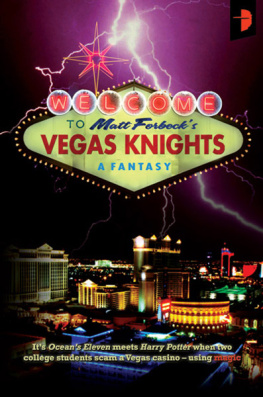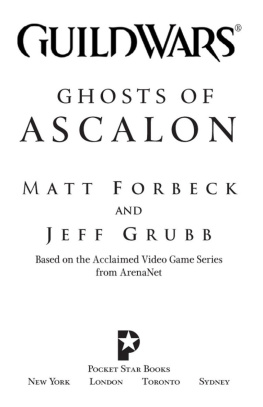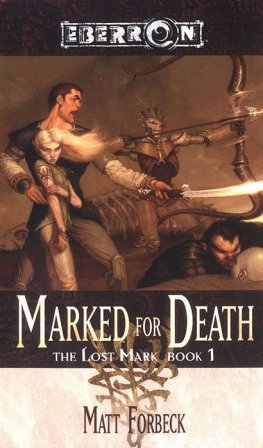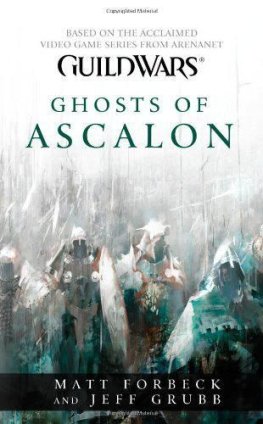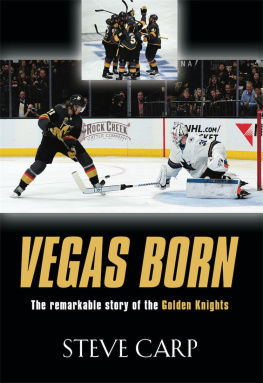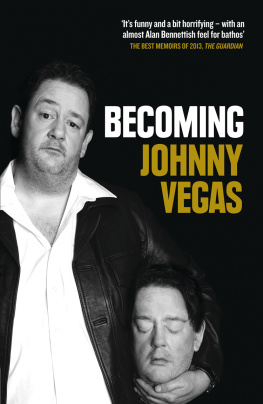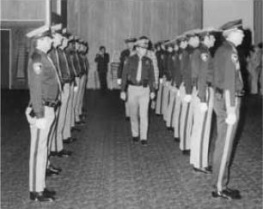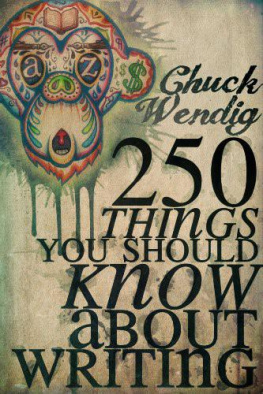Dedicated to my wife, Ann, who is always willing to takea gamble with me, and to our kids Marty, Pat, Nick,Ken, and Helen who are always our biggest payoff.
Extras...
AUTHOR'S NOTES
Vegas Knights started out as a game.
Way back in 2004, Jordan Weisman of WizKids had an idea for a collectible card game based on Poker, which had reached the height of its popularity at that point. Someone had figured out how to televise Texas Hold 'Em by putting a camera under the hole cards, which gave the rest of us a way to understand the drama that unfolds at a table, and it took off at warp speed.
Jordan is one of the sharpest guys I've ever known. In the '80s, he founded FASA and created games like BattleTech and Shadowrun. He got into networked computer games early on and sold that spin-off business FASA Interactive to Microsoft. While there, he helped launch the X-box and spurred alternate-reality games (ARGs) into the mainstream with The Beast, a massive game set up to promote Steven Spielberg's A.I.
He went on to found WizKids and create the collectible, prepainted miniatures game category with Mage Knight and its follow-up Hero Clix. He's since moved on from there to found Smith & Tinker, which created the handheld/online game system Nanovor, and another tabletop game company, Wells Expeditions. Meanwhile, he also co-wrote interactive novels like Cathy's Book and Personal Effects: Dark Art and led other ARGs that promoted things like Halo and The Dark Knight.
Most people only get one or two great ideas in their lives, and if they're lucky they get to ride them until they end. Hopefully they make enough to retire on, and you might never hear from them again. Jordan's a serial entrepreneur who not only gets lots of these ideas but manages to put them into action and make something both cool and profitable.
I've been friends with Jordan since his FASA days. I worked with him on a few things over the years, and I even helped him out with that A.I. ARG, writing text for a number of the websites and lending a hand with a Japanese cell phone game that became part of its monstrous network of clues. So, when Jordan asks me to help him with something, I dive right in.
Jordan wanted to make a collectible card game out of Poker, and he asked me to tackle the challenge of designing the game. I hammered away at it in several different incarnations, each time getting closer to the goal.
The first version of the game was called Battle Poker, in which warring factions from across all time and space fought it out for supremacy. It hit all the design requirements, and it played well enough. The problem was it just wasn't fun. The collectible bits threw off the Poker bits enough to make it not intriguing but annoying. Ironically, I'd helped out with another collectible card game with Poker mechanics a few years before. Doomtown was based on Deadlands, a hit roleplaying game published by Pinnacle Entertainment, of which I was the president at the time. My business partner company CEO Shane Hensley had come with Deadlands, this brilliant game about the Weird West, featuring zombie cowboys and far stranger things. It used Poker mechanics, so when Dave Williams (then of AEG and now with Red 5 Studios, designing the massively multiplayer online game Firefall) sat down to design Doomtown, he plugged it full of Poker bits as well. Shane and I helped polish up Dave's excellent design a bit, and we played the hell out of that game.
So, I knew Poker well, and even had some experience working it into other games. Battle Poker, though, just didn't work. Mechanically, it was great, but the fun never showed up.
At Jordan's request, I gave the game another shot, and it morphed into Battle Champs. In this version, you managed a team of heroes and monsters battling against each other in gladiatorial combat for the amusement of the evil bastards who'd crushed the planet under their collective heel. You not only set up the battles but bet on their outcome.
Again, the game played well enough. It beat Battle Poker hollow. But it still wasn't the kind of fantastic fun such a game demands.
Late in 2004, I gave the game another shot. This time, I came up with the title Vegas Knights. This version of the game worked a lot like Battle Champs, but with some key differences.
In working through the earlier versions of the game, we'd been trying to replicate the tensest dramatic moment in Poker: the reveal at the end of a hand. In a collectible card game, though, you can customize your deck, and that threw all that off horribly. The reveal became too difficult to predict.
In Vegas Knights, I concentrated on the other dramatic part of Poker: the betting. The quick movement of cash, the bluffing, the attempts to read your opponent and figure out what he's really up to, that all got turned up to eleven.
And the game worked. It sang. Best of all, it was fun.
As "The Object of the Game" from that draft read:
In Vegas Knights, you are a manager of a team of wizardlygamblers in a modern world filled with monsters and magic. Youcoordinate the efforts of your team to win the big prizes and comehome from Las Vegas with the ultimate jackpot.
As a team manager, you pit your knights against others in gladiatorial contests of fate and fortune in Las Vegas. As you do, you beton the outcome of each contest. The object of the game, then, is not towin the contests, although that can help. What you really want todo is make the most money.
At that point, Jordan accepted the game and brought it in-house for his team of developers to tinker with and polish. By the time they were done with it, they'd ditched the Vegas Knights background in favor of an Old West theme, which was something I'd suggested early in the game's development too. I just love that era. Besides developing Deadlands, I'd also written two other Western roleplaying games Western Hero and Outlaw essentially the same book reworked for two different rules systems: the Hero System (Champions) and Rolemaster, respectively.
With the game now titled High Stakes Drifter which it came out as in 2005 I looked at the concept work I'd done on Vegas Knights and thought it would be a damn shame if it all got thrown away. I had an idea for a novel that mixed elements of Harry Potter and Ocean's 11, and while it wasn't exactly like the Vegas Knights game background, it shared enough themes that I didn't want to have any qualms about stepping on that old material's toes.
Plus, I just loved the title.
I asked Jordan if he'd be willing to release that unused material back to me, and he did so with one condition: I couldn't make a game out of it first. Since I'd been thinking a novel anyhow, we had an instant deal.
That fall, I pitched Vegas Knights to Solaris. At the time, it was a new imprint for original novels being published by the Black Library, set up under the guidance of an old contact of mine, Marc Gascoigne. I'd written a number of humorous novels for them already, based on Blood Bowl, the game of fantasy football the kind in which elves, dwarves, vampires, zombies, and so on battle for possession of a spiked ball on an Astrogranite field. I figured Vegas Knights might be a good fit for Solaris, but it was declined.
In 2006, I set about developing a treatment for
Next page
